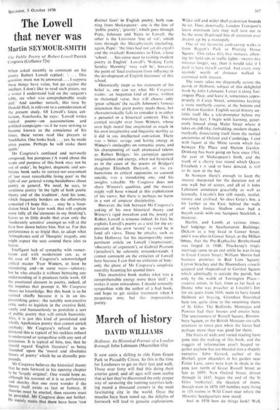The Lowell that never was
Martin SEYMOUR-SMITH
The Public Poetry of Robert Lowell Patrick Cosgrove (Gollancz 52s) When asked recently to comment on his poetry Robert Lowell replied: '. . . This question must not be answered.... I suppose these things have value, but go against the intellect. I don't like to read such pieces, see a writer I understand laid on the surgeon's table, see what was comprehensible made dull.' And another remark, this time by Donald Hall, is relevant to a consideration of the present study. Of Lowell's latest col- lection, Notebooks, he says: 'Lowell writes topical poems—on assassinations and political campaigns—as if he were striving to become known as the conscience of his times; these verses read like prayers to Stockholm. One looks back ... yes, he made great poems. Perhaps he will make them again.'
Mr Cosgrave's confused and nervously composed, but pompous CA word about the scope and purpose of this book may not be out of order', he begins), dogmatic and am- bitious book seeks to correct our assessment of 'our most remarkable living poet' in the light of our general wrong-headedness about poetry in general. We need, he says, to scrutinise poetry 'in the light of both poetic theory and of the tradition'. And his tone, which frequently borders on the offensively
conceited (I hope this . may be a foun- dation brick for later work that will explain more fully all the'elements in my thinking'), leaves us in little doubt that even only the 'moderately sensitive' amongst us will at the least bow down before him. Not so. For this performance is so frigid that, to adapt what Aristophanes said of Theognis' tragedy, one might expect the seas around these isles to freeze.
Intelligent lack of sympathy with roman- ticism and with modernism can, as in the case of Mr Cosgrave's acknowledged critical master Yvor Winters, at least be stimulating and—in some ways—salutary; but he who attacks it without betraying any understanding of it produces futile work. Of the emotional element in poetry, indeed, of the impulses that prompt it, Mr Cosgrove shows no knowledge. But this book is to be resisted chiefly because it is in an im- poverishing genre: the notably non-creative critic seeks to legislate in the creative field, sourly and humourlessly to postulate a sort of public poetry that will enrich humanity. Alas, it is just this kind of postulated and wholly Apollonian poetry that cannot enrich anybody; Mr Cosgrave's refusal to un- derstand this is typical of his reckless refusal to understand or sympathise with any sort of pessimism. It is typical of him, too, that he should regard 'English literature' as being 'founded' upon the 'moral and absolutist theory of poetry' which he so dismally pro- pounds.
Mr Cosgrove believes the historical theory that he puts forward in his opening chapter to be largely original'. One would hope so, although his account of it is so perfunctory and sketchy that one must wonder if the theory itself exists as fact or fantasy. If theories must be erected, then reasons must be provided. Mr Cosgrove does not bother. He merely states that there have been Iwo distinct lines' in English poetry, both run- ning from Shakespeare: one is the line of 'public poetry', 'gravity', which goes through Pope, Johnson and Yeats to Lowell; the other is the Leavisian 'line of wit', which runs through the Metaphysicals (including, again, Pope: 'the lines had not yet di% erged') and the (wicked) Romantics to Eliot, %%hose 'school ... has come near to ruining modern poetry in English'. Lowell's 'Waking Early Sunday Morning' may well be', however, the point of 'final exclusion from influence in the development of English literature' of this school.
Historically inept as his statement of his belief is, one can see what Mr Cosgrove wants: an Augustan kind of prose. written in rhetorical verse, that will choose only 'great subjects' (he recalls Johnson's famous injunction that great poetry needs these, but characteristically fails to consider it in either a personal or a historical context). This is carried straight over from Winters. whose own high moral line originated as much in his own imaginative and linguistic sterility as it did in any intellectual conviction. There was a bitter, savage and hating energy in Winters's onslaughts on romantic poets, and his championing of such attenuated talents as Robert Bridges: his campaign against imagination and energy, when not hysterical as in the cases of the poems of Bridges's daughter Elizabeth Daryush, or his ex- hortations to critical opponents to commit suicide, was a stimulating one, and his insights valuable. Mr Cosgrove does not share Winters's qualities, and the master might well have winced at this exploitation of his views; but there is perhaps no harm in a sort of amateur discipleship.
However, the link between Mr Cosgrave's yoking of his own historical theory and Winters's rigid moralism and the poetry of Robert Lowell is tenuous indeed. In fact, he exploits Lowell's poetry as a text for the ex- pression of his own 'severe' (a word he is fond of) views. Those he attacks, such as John Holloway for his incomparably more pertinent article on Lowell ('imprecision', 'obscurity of argument'), or Gabriel Pearson ('priceless'), he solemnly misunderstands. I cannot comment on the criticism of Lowell here because I can find no criticism of him: only the ghost of Mr Cosgrave's simplistic morality haunting his quoted lines.
This insensitive book makes what was a comprehensible energy more than 'dull': it makes it seem miraculous. I should normally sympathise with the author of a bad book, and hope to get similar treatment when I perpetrate one; but this impoverishes poetry.






































 Previous page
Previous page